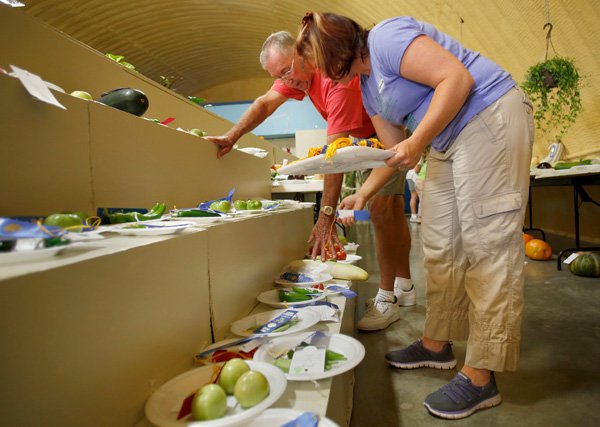FAYETTEVILLE — Calvin Bey leaned over tables laden with beans, tomatoes, zucchini and eggplant, inspecting each piece of produce with a seasoned eye. An assistant carefully placed a blue, red or white ribbon next to the vegetable or fruit according to his instruction.
Bey spent a couple of hours Monday judging field or garden crops grown by gardeners younger than 18 as part of the annual Washington County Fair. The exhibit halls hadn’t opened yet and the midway was quiet as Bey and other judges made their way up and down the rows of crops and floral arrangements in the Horticulture Building.
Three or five pieces of each crop are arranged on 6-inch foam plates on tables inside the long building. Junior crops are on one side and adult crops on the other.
Bey doesn't taste the food. He looks at appearance, uniformity of the pieces and if they’re insect and disease free.
Bey, who is recognized locally as a specialist in organic vegetables, is a certified master gardener and has been gardening for 40 years.
“The quality this year is generally good, above average,” Bey said.
Neal Mays, Benton County extension agent, judged field crop entries submitted by adults. He, too, was visually inspecting the crops, checking for quality, conformity and uniformity.
Rainfall this year produced a bumper crop of exhibits in the junior and adult divisions, said Mary Crumbley, a superintendent of the junior divisions of field crop, vegetables and fruits, and entomology.
The rain, combined with more children joining 4-H clubs, contributed to the growth in fair exhibits, Crumbley said.
“Gardening and 4-H teaches them responsibility,” Crumbley said. “It takes as many hours to grow a garden as it does to have cattle as a project. It’s full time.”
Mary Loftus was working in Thompson Hall with 800 jars of jam, jelly, tomatoes, green beans and other fruits and vegetables. Some of the jars were canned by members of 4-H and FFA and some were prepared by families.
“Each of these jars have faces on them,” said Loftus, who teaches a canning class supported by the extension service in early summer in Fayetteville.
The rules in the food preservation division require products be prepared at home following U.S. Department of Agriculture regulations. Judging is based on a visual inspection of the product and how much air space was left at the top of jar. Again, there is no taste testing. The children are held to the same standards as adults, Loftus said.
About half of the junior preservation exhibits will be forwarded to the Arkansas-Oklahoma State Fair in Fort Smith for district judging and the winners will go the Arkansas State Fair.
“The fair jar is meant to inspire,” she said. “Each child gets a learning opportunity.”

